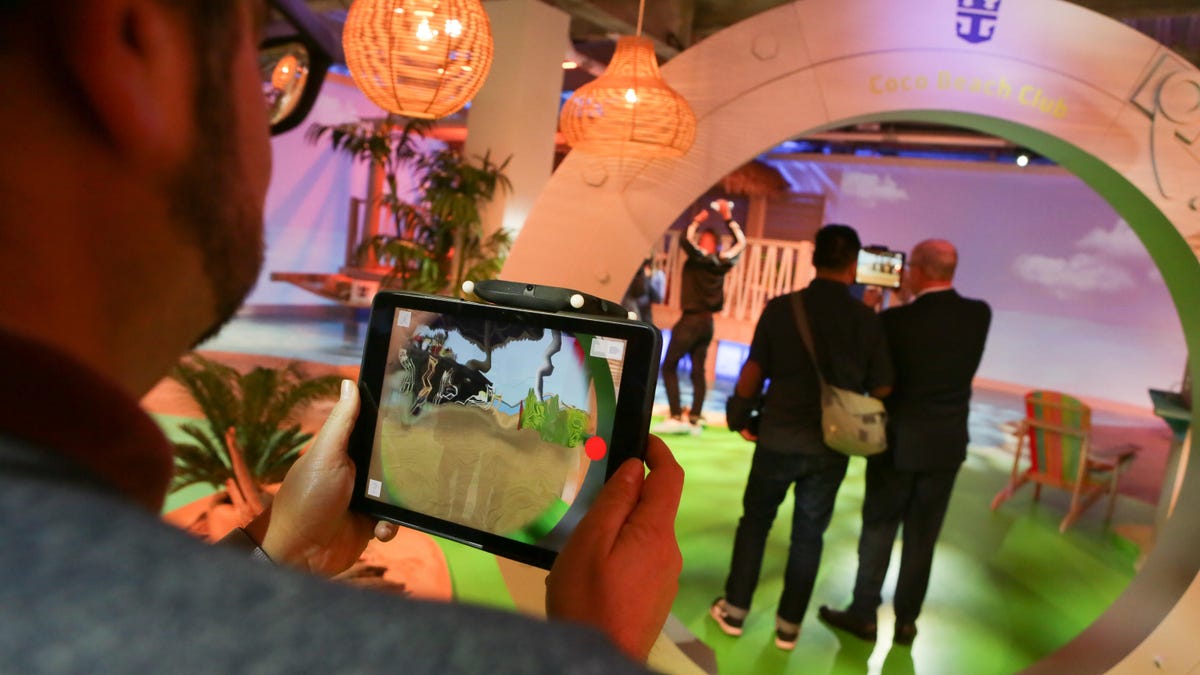I toured private islands in AR and VR, and all I got was a towel
Commentary: Royal Caribbean is trying to lure you to your next vacation with augmented and virtual reality.

I had just stepped through a large ring portal. I stood staring, through an iPad , at a tropical island. As I turned my body, I could see the sunshine through the palm trees. I could see the super-tall water slide. I could see cabanas, and hammocks. But this is on a flat tablet screen. The only real thing about my would-be vacation was the coconut drink in my hand and the carefully arranged deck chairs.
It's all part of an event hosted by Royal Caribbean, the cruise line, to promote a new line of private island excursions called the "Perfect Day Island Collection." Outside, the temperature is hovering above freezing, and my muscles are still aching from shoveling snow a few days ago. But in here, the fourth floor of a South Street Seaport building off the East River in Manhattan has been transformed into a space designed to show off Coco Cay, a redesigned resort opening in the Bahamas next year.
Royal Caribbean has been exploring immersive technology to improve its cruise experiences: VR, escape rooms and eventually wall screen-equipped suites. But for now, the company's also trying to use AR and VR to better upsell its vacations. The company has designed an iPad app that offers a peek at the company's private island and its amenities, allowing a user to "walk through" the island and take videos and photos. Which is exactly what I did.
The event tracked over a hundred guests with iPads walking through deliberately "Stargate"-inspired portals, tracked using 60 ceiling-mounted infrared cameras looking for large tracking modules on each iPad. The effect was like tablet AR matched with VR-style full room tracking.
It just didn't really make me want to go on vacation.
I liked the VR hot air balloon a lot more. The island will feature actual hot air balloon rides, and the company simulated a trip 400 feet (about 120 meters) up to look at the island's layout. I stood in a simulated hot air balloon gondola, wearing an HTC Vive VR headset. I held the actual rail and leaned over to look at the VR island, built using the company's design renderings. It was fun.
People on a VR balloon ride with Vives.
But what is this being used for, exactly? Royal Caribbean suggested that, in addition to the upcoming iPad app, there could be pop-up kiosks using the Stargate-like portals in areas like airports, where captive audiences have nothing better to do than try a free bit of engaging advertising.
Or, perhaps, on the cruise ships themselves: Royal Caribbean is spending $900 million on upgrading its vessels, adding everything from escape rooms to laser tag to VR entertainment experiences. Future ships will have even more immersive concepts, as we saw last year. Again, a cruise ship is a captive audience. Why not tour your next port of call virtually on a lazy at-sea day?
Real coconut drink, artificial island.
I wasn't wowed with the demonstrations: the renders looked too static, too artificial, like a video game. I'm curious whether a portal could eventually let you step into the actual island, photo-mapped into a real-time 3D view of beach cabanas, maybe even letting you send AR postcards back home. Maybe that's farther off in the future.
In the end, I walked back out into the blustery Manhattan winter, warmed only by the rum in my belly and a giveaway beach towel emblazoned with the Royal Caribbean logo. The transition from augmented reality on the beach to actual reality surrounded by ice is never an easy one -- but at least there's no sand in my shoes.
Royal Caribbean's high-tech ship lets you be lazier than ever: The future of ocean cruises will require even less effort from you.
Fall inside a black hole in this VR experience: Darren Aronofksy's "Spheres" sold for more than a million bucks. We tried it out.

